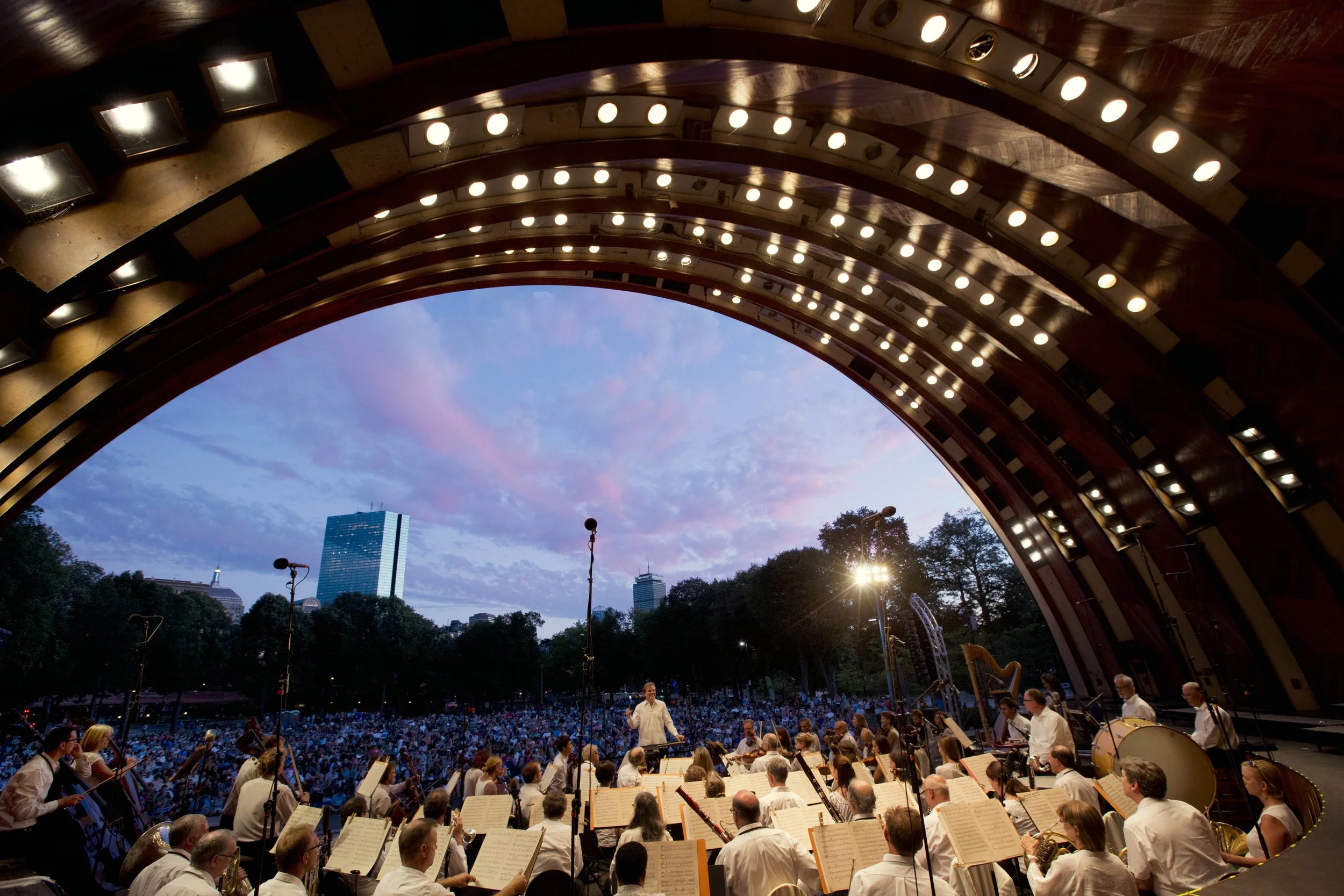The horn and percussion sections' view from the Hatch Shell, as Christopher Wilkins conducts the Landmarks Orchestra. Michael Dwyer photograph
There’s one thing that ZUMIX, the New England Aquarium, London’s St. Paul’s Girls’ School choir, Camp Harbor View, the Boys & Girls Clubs, and the One-City Choir have in common.
They all perform at the Hatch Shell with the Landmarks Orchestra.
They’re not alone either. The free Landmarks’ concerts on the Esplanade, which open with a welcoming “Season Tune-up” on July 11 and run each Wednesday throughout the summer, begin with music director Christopher Wilkins and the orchestra. But Wilkins reaches out in every imaginable direction to embrace the idea that music needs to be shared, and that everyone gets a warm welcome to do so.
Esplanade concerts stretch back historically to Arthur Fiedler, longtime Boston Pops conductor, who established a practice of giving free summer performances in 1929. The Landmarks Orchestra renewed the tradition under its founder, the late Charles Ansbacher, in 2001.
Now the concerts are a city-wide celebration. For this season’s official opening night, July 18, to mark the 100th anniversary of the premiere of Gustav Holst’s “The Planets,” Wilkins and the orchestra will perform the great astrological work.
And the St. Paul’s Girls’ School of London, where Holst taught and where he composed “The Planets,” will send their choir to be part of the celebration. Landmarks has also commissioned a new work to accompany “The Planets,” Gonzalo Grau’s “Pegasus Promenade.” Grau’s composition features the girls’ choir and ZUMIX, the East Boston community music organization and longtime Landmarks partner.
“At the Hatch Shell, we perform next to all the energy of the city,” Wilkins says. “For the most part we need to play big, colorful, high-impact works like ‘The Planets.’ We were planning to perform it a few years ago, and we were approached by the St. Paul’s Girls’ School. We decided to put it off till this year for the centenary.”
“Once we had ‘The Planets’ planned for opening night, we asked ourselves if we could do something more,” says Landmarks’ artistic administrator Arthur Rishi. “We had already asked Gonzalo to co-write a piece with ZUMIX, and we sent him to London for a few days to work with the girls’ choir and get them involved in the piece.”
The project symbolizes the working methods of Landmarks. Later this summer (Aug. 15), an extensive collaboration with the New England Aquarium has resulted in Stella Sung’s “Oceana.” Sung blends the Aquarium’s ocean sounds’ research into an orchestra work. Wilkins has surrounded that world premiere with Debussy’s “La Mer,” excerpts from Bernard Herrmann’s “Moby Dick,” and Ravel’s “Une Barque sur l’océan” to complete the nautical theme. Instrumentalists from the Boston String Academy join the orchestra.
“Our partners all appreciate being part of the process,” Rishi says. “Chris is a master of integrating these disparate elements.”
Additional concerts this summer include a performance of Verdi’s “Requiem” (Aug. 1), and guest programs by the Boston University Tanglewood Institute (a Bernstein celebration, July 25), the Longwood Symphony Orchestra (Aug. 8), and the Mercury Orchestra (Aug. 29).
“When you hear a big piece like ‘The Planets,’ like the Verdi ‘Requiem,’ or Debussy’s ‘La Mer’—that’s what the orchestra does best,” Wilkins says. “And when we work with these youth organizations in creating music—that gets us involved with a broad range of the Boston community.
“It’s one thing to play a 30-minute concert for them,” he says. “But if those kids are involved for a month or more, they own the work. It has a depth of impact in their lives. That’s why these collaborations are important.”
The Landmarks Orchestra begins its Wednesday series of free concerts at the Hatch Shell on Boston’s Esplanade with a Season Tune-Up on July 11 at 6:00 p.m. Concerts for the season continue through Aug. 29. There are rain dates, or indoor alternatives, scheduled for most performances. For last-minute information visit www.landmarksorchestra.org or call 617-987-2000.


